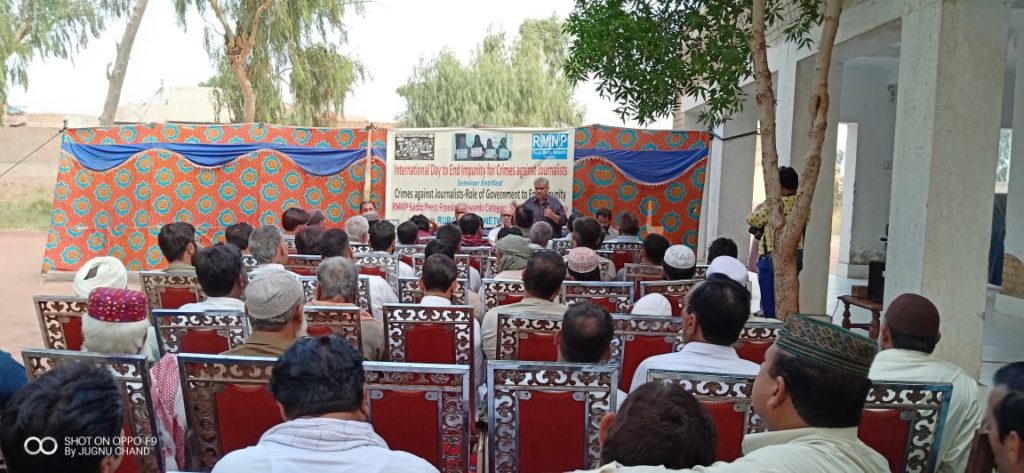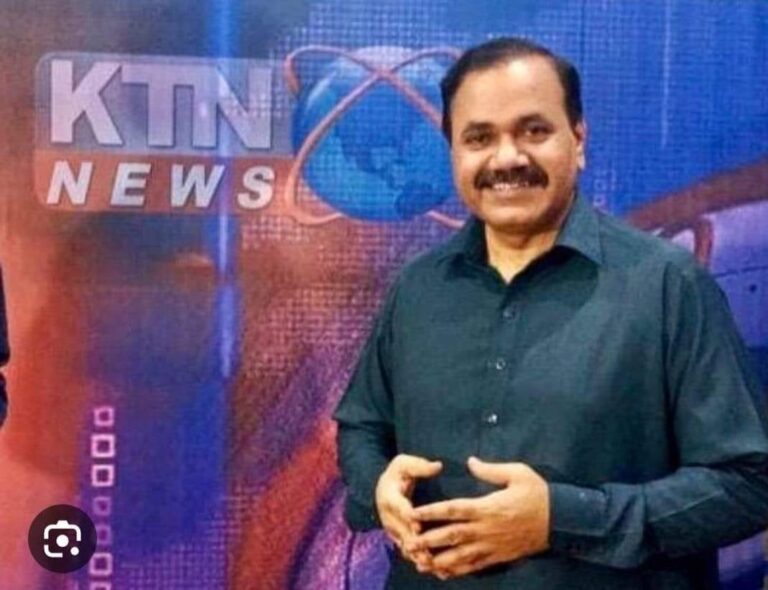Justice demanded for 7 journalists murdered in Pakistan in 2019

The Rural Media Network Pakistan condemned the ongoing impunity for crimes against journalists in Pakistan and said that justice required for those seven journalists who killed in Pakistan in 2019.
On the eve of International Day to End Impunity today, the Rural Media Network Pakistan demanded of Pakistan federal government and all four provincial governments to expedite investigation of these cases and get approval of the parliament by tabling protection of Journalists bill without further delay. RMNP also demanded the appointment of special public prosecutors at federal and provincial headquarters to pursue the murder cases of Pakistani journalists.
President RMNP Ehsan Ahmed Sehar while addressing the seminar entitled “Crimes against Journalists-Role of Government to End Impunity” in the premises of canal rest house Chanigoth today, said that as per RMNP monitoring seven Pakistani journalists Malik Amanullah Gharro, Ali Sher Rajpar, Ilyas Warsi, Muhammad Bilal Khan, Mureed Abbas,Mirza Waseem Baig and Zafar Abbas were killed up to 12th September ,2019.He informed that out of these slain journalists three belong to Sindh, two from Punjab, one each from Khyber Pakhtunkhwa and federal capital Islamabad.

He further stated that in light of rising rates of violations against journalists and media professionals around the world, the national, international and regional mechanisms are capable of prosecuting and ending the impunity of perpetrators of violence against journalists.
Ehsan Ahmed Sehar suggested that some legal procedures are to be considered prior to the activation of these mechanisms and which the media institutions need to be aware of.
He added that in the case of violations in conflict zones, there is a single international mechanism that can be activated efficiently; that is: “the International Criminal Court” in accordance with Article 8, because the cases are categorized as war crimes.
President RMNP stated that regarding the violations against journalists, media professionals and activists, the first steps that must be taken are documenting these violations, whether they are cases of prevention, detention, torture or enforced disappearances. Then, selecting the correct procedure to deal with the violation; through seeking national legal recourse, before moving to international justice.
He told the participants that indeed it is a necessary condition; this procedure is one of the actions that most media and human rights institutions and organizations do not pay attention to, because no appeal or complaint can be accepted unless this step is completed and after that only, it is possible to talk about other international or regional mechanisms.
Commenting on the available international mechanism for the victims of freedom of expression and their families, he said that resorting to international mechanisms, including the activation of the roles of United Nations Special Rapporteurs, within the framework of the International Covenants on Civil and Political Rights and the International Covenants on Economic, Social and Cultural Rights; in addition to the Social Council, which has important secret as well as public mechanisms. It is beneficial to consider these mechanisms in order to serve justice, redress the victims, strengthen the rule of law and ensure accountability. In this context, cases can be looked at within the framework of the efforts of the Special Rapporteur on the promotion and protection of the right to freedom of opinion and expression, Special Rapporteur on human rights defenders, Special Rapporteur on extrajudicial, summary or arbitrary executions and Special Rapporteur on enforced or involuntary disappearances.
Responding a question from the floor, he said that the working institutions and the advocates of freedom of opinion and expression have full right to activate these mechanisms according to certain procedures, but the error may be in the work methods adopted by these organizations.
President RMNP revealed that for the activation of International mechanism, specific steps must be followed; for example, special rapporteurs or committees within the United Nations working groups cannot act on their own, they require receiving complaints on the subject from the violated persons or institutions.
Defining the distinction between violations committed in zones of peace and areas of war and conflict, he further informed that in the case of war, there is only one international mechanism that can be effectively activated in the case of violations against journalists in conflict zones; that is the International Criminal Court in accordance with Article8, because the cases are categorized as war crimes. I think , as a sort of adaptation with Article 8 of the Rome Statue of International Criminal Court, the 1977 protocol considers all the crimes against journalists in conflict zones as war crimes.
Mr Sehar also highlighted the prevailing media situation in Pakistan and observed that Pakistani media remained never free in so-called all democratic and military governments. Currently media facing financial crisis and thousands of journalists working in both print and electronic media have been sacked due to the downsizing and closure of newspapers and TV channels. He urged the rural journalists to shun their pretty differences in the larger interest of the journalist community.
Earlier Ex-MP Arif Aziz Sheikh paid rich tribute to the RMNP for his services rendered in the defence of press freedom and promotion of the freedom of expression. He expressed his pleasure that RMNP equipped a large number of journalists with safety training since 2010 and encouraged journalists by giving them RMNP Sadiq Press Freedom Awards since 2005.He hoped that RMNP would continue its struggle in future despite hurdles. He announced to support” RMNP Sadiq Press Freedom Awards category B and C ,2020.
Prominent intellectual Hassan Askari Sheikh in his speech stated the by observing an International day in far-flung area, RMNP has set a new tradition. He admitted that no other Pakistani media development organistation reached at the door steps of rural journalists at union council level. He said that currently media is under pressure in Pakistan but it has refused to bow down. He demanded of the government to provide safety umbrella to the working journalists so they could work without any fear.
Leading educationists Muhammad Suleman Farooqi and Syed TanveerulHassan Bukhari also addressed the seminar. They demanded of the government for the immediate tabling of “Protection of Journalists Bill “in parliament and urged Premier Imran Khan to compensate all the families of those Pakistani journalists who were killed in the line of duty since 2000.
Liaquatpur Electronic Media Association President Taj Ghaus, Mufti Mehboob Ahmed, Additional General Secretary Press club Ahmed Hameedullah Khan Aziz and President Press Club Chanigoth Shahid Bashir Anjum also delivered their speeches. It may be recalled that this seminar was organised by the Rural Media Network Pakistan in collaboration with daily newspaper Nawa-I-AhmedpurSharqia and Press Club Chanigoth.

Sadiq Press Freedom Cash Awards Category B & C Giving Ceremony
President RMNP Ehsan Ahmed Sehar announced to give RMNP Sadiq Press Freedom Cash Awards Category B & C to two press freedom advocates Shahid Bashir Chaudhry President Press Club Chanigoth & Correspondent Jang-GEO TV and Hameedullah Khan Aziz an editor of monthly magazine in this seminar..Ex-MP Arif Aziz presented RMNP Sadiq Press Freedom Cash Award Category B to Shahid Bashir Anjum while Hassan Askari Sheikh presented Sadiq Press Cash Award Category C to journalist Hameedullah Sheikh.Both awards were sponsored by Sahibzada Muhammad Umar Khan Abbasi grandson of the last ruler of former Bahawalpur State Nawab Sir Sadiq Muhammad Khan Khamis Abbasi.
Source: Daily Nawa-I-AhmedpurSharqia /RMNP


